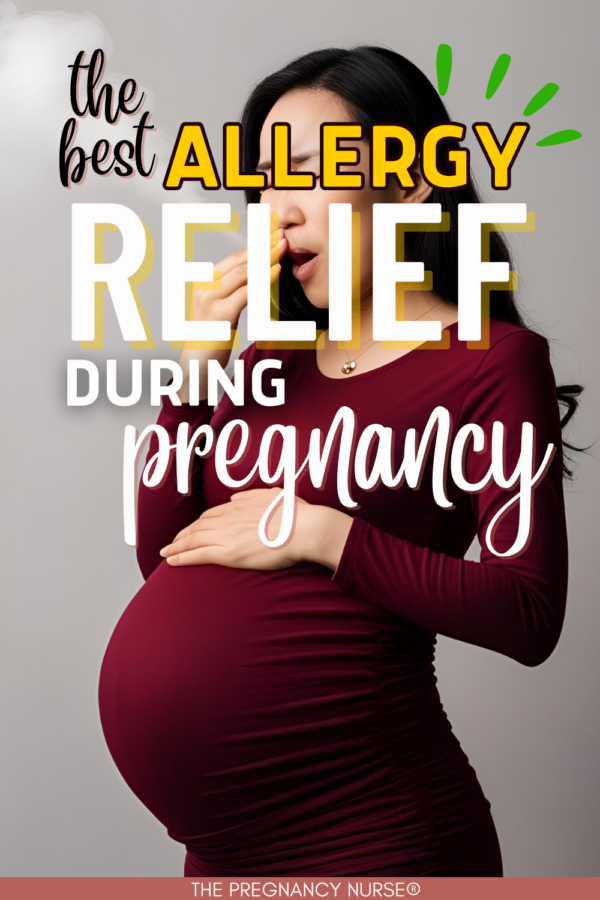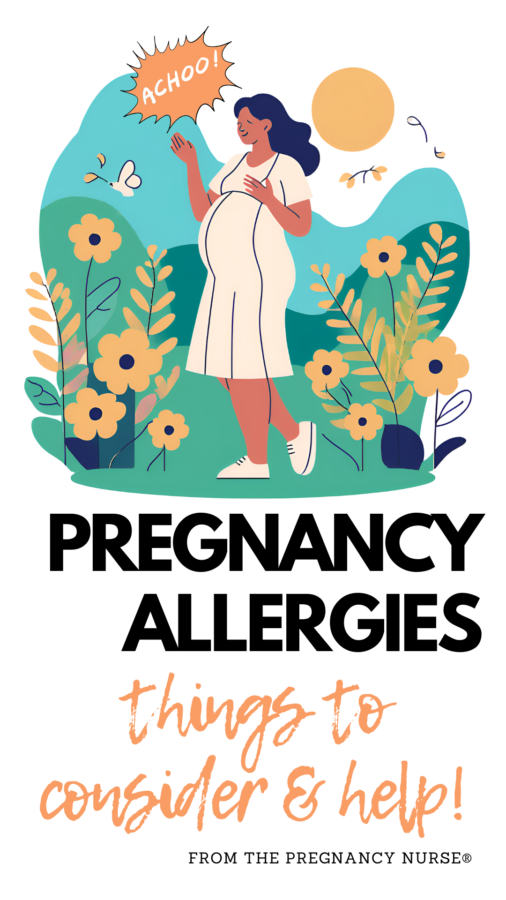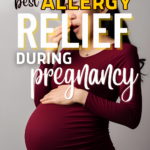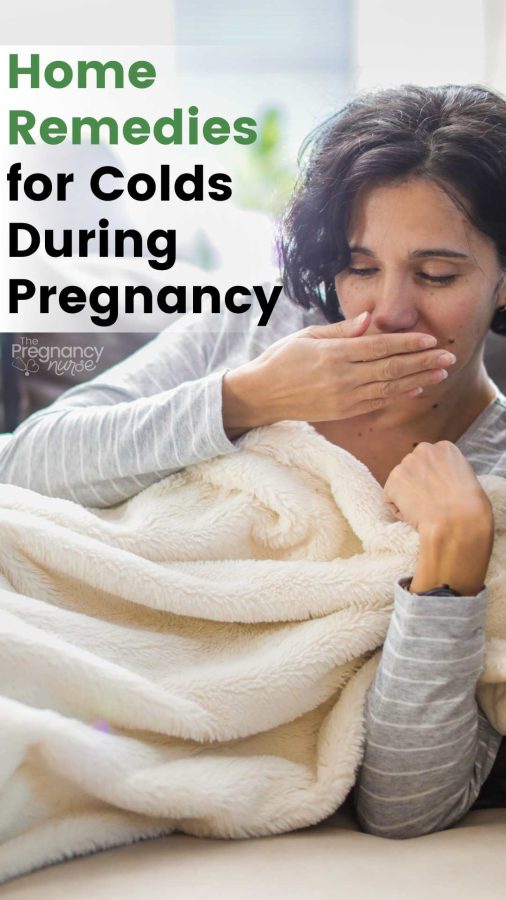📣 YOU are clearly getting prepared for pregnancy, birth & beyond — but do you wish your partner was more involved (looking for a teammate rather than just a cheerleader)? Couples love THIS! 💛🧡💚
Feeling allergies (seasonal or otherwise) come on during pregnancy? Today we’re going to share what is safe to do and what is NOT safe to use when it comes to allergies in pregnancy. There ARE some treatments you should try to avoid, so I’m glad you’re here.

While we’re here, don’t forget to grab my hospital packing list for when you’re ready:
What to Consider with Allergies
Allergies are tricky because the symptoms vary a lot:
A little runny nose — that may be allergies, or it may be pregnancy rhinitis — and allergy medications won’t help at all (where the mucus membranes swell and make your nose feel stuffy and sometimes run). Could kleenex be your best bet — is it worth the risk of these meds (which varies). Just something to consider.
Wheezing — obviously, breathing is important, and most of the common allergy meds are “better” than needing an inhaler or a rescue inhaler.
Itchy eyes — if this is your only symptom, could eye drops be more helpful (and get less to the baby?)
Itchy throat, ears etc — this can sometimes progress into wheezing but can be VERY annoying. I get this.
As always, I’m just here to give you information, not advice. It’s important you think about your symptoms and then go to your provider who knows you, your individual circumstances and needs and can recommend a course of action for you. This isn’t medical advice and please do talk with your provider before taking any medications during pregnancy.
Want to know more tips on pregnancy medications? — check out these posts:
- Home Remedies for a Cold While Pregnant
- What Cough Medicine Can a Pregnant Woman Take? What OTC is safe during pregnancy?
- Unisom for Sleep During Pregnancy
- Can You Take Sudafed While Pregnant – When to talk to your provider.
Types of Allergy Medications:
I’m just going to go into the very BASIC allergy medications. If your allergies are more severe this is definitely a conversation you want to have with your provider ASAP.
Pregnancy medications are given a letter grade. A meds are things that have been shown to HELP pregnancy — things like folic acid. B meds haven’t been proven to shown an defects (especially in animals, as studies during pregnancy are rare), C means there’s a chance of harm but no great studies or proof exists that it’s a problem.
Antihistamines
There seem to be two schools of antihistamines.
One like Benedryl that is taken, lasts 4 hours and then is out of the system. It doesn’t give a long-term effect, but can be helpful in the short term.
Many people don’t know that Unisom is also an antihistamine and is often used for morning sickness or nausea in pregnant women.
Studies have shown these meds aren’t great when taken long-term for people, and most doctors are recommending you find something else to either help with your sleep or allergies than these.
Most of these are a category B meaning we haven’t seen risks in studies or in the human population as of yet.
The other category of antihistamines are things like Zyrtec, Claritin, Allegra.
These are 24-hour medications, often taken daily and are more recommended for allergies overall.
These seem to also all have a pregnancy category B. If you have frequent allergies, most providers are going to recommend this type of medication vs a Benadryl just because of the side effects/risks of Benadryl (including being VERY sleepy).
Corticosteroid
These are often nasal sprays that go directly into your nose.
The one most often used is Flonase. It’s a steroid that you apply directly to where the allergens are entering your body to tell your body to CHILL OUT.
However, Flonase is a category C — meaning it’s not as well studied, and may have some risks.
Allergy Eye Drops
These again, are antihistamine eye drops applied directly to your eyes which may be your problem area.
There seem to be quite a few types.
It looks like those that contain sodium cromoglicate like Allercrom can be considered safe (although I don’t see a pregnancy category).
However, as one who gets really itchy eyes I like to use something more like Zadiator which is considered an antihistamine and that is a pregnancy category C.
So, if you have itchy eyes I’d definitely talk with your provider.
Simple saline drops are considered safe and that might be enough for you (as it may be more from dry eyes than allergens).

DIY Allergy Treatments
There are some “DIY” allergy treatments you can use:
Avoid Known Allergens — allergic to dogs? It might be good to steer clear of them in enclosed spaces while you’re pregnant. Obviously, for some people this is easier than others.
If you have seasonal allergies, maybe you look to get exercise at home rather than going out for a walk to limit your pollen intake.
Nasal Sprays/Washes — you can use a netti pot or a nasal wash to wash out allergens from your upper respiratory system. These often just contain some salt, and are considered safe (and the salt helps calm down your mucus membranes)
I know they sound horrible, but it wasn’t near as bad as I thought it would be. There are also some saline sprays you can just spray up if you can’t do the whole “wash”.
Air Purifier — I have one of these we turn on in our room when we’re noticing more seasonal allergies. It seems to help, but who knows. It’s worth a try for us (and it constantly tests the air and only kicks on when there are issues with the air.
You could also consider heavier air filters with your a/c system.
What I Did
Sometimes it can help when I share what I did as I balanced the risks and benefits for myself.
I have some pretty serious seasonal allergies that can lead to asthma/wheezing. Albeuterol is a pregnancy category C. I know I also just don’t feel great when I take it (heart rate goes up, and I just feel yucky) — so I wanted to avoid it.
I took Zyrtec when I felt like my allergy symptoms were happening, and I tried to avoid it if I could.
I used just some saline drops when my eyes were itching and I don’t know if it was just in my head or maybe it washes out the irritants — either way, it seemed to work when I needed it.
Of course, I also took a hospital birth class that didn’t prepare me at all — so I’m not always a great example. This is why I now recommend this one. So great, fast, and a great price!
There is something else to consider:
How far along area you?
Early in pregnancy baby is forming really important parts of their body. Brain, organs, etc.
We really don’t know how drugs interact with baby’s formation during this crucial time. In that first trimester to second trimester we REALLY push to avoid medications that aren’t necessary or helpful (aka folic acid, and aspirin if you have a risk of preeclampsia).
As you get further into your pregnancy, those crucial organs are formed and your baby is mostly growing in size and getting their body ready to live outside. SO, providers are a bit more lenient on meds during this phase (unless they’ve proven to be problematic).
ALSO, you’re already going to be a bit short of breath as baby takes-up your lung space (rude, right?) — so, we really don’t want to hurt your oxygenation with wheezing in addition to that.
So, if a simple daily medication can help — it might be worth it to avoid bigger issues.
In summary:
- Think about the symptoms you’re having from allergies
- Talk with your provider about your history and what’s going on right now
- Make a plan moving forward and keep monitoring things
Many people find that their allergies are actually less during pregnancy — maybe because of how our bodies immunosuppress things to help baby stay inside. So, just because they’ve been bad in the past, you might not have the issue now?
Honestly, pregnancy can be complicated. I’d love to hang with you during your pregnancy to give you just what you’re looking for:
What’s YOUR allergy plan with your pregnancy? Tell us below!






 7 Habits of Happy Pregnant Women
7 Habits of Happy Pregnant Women
